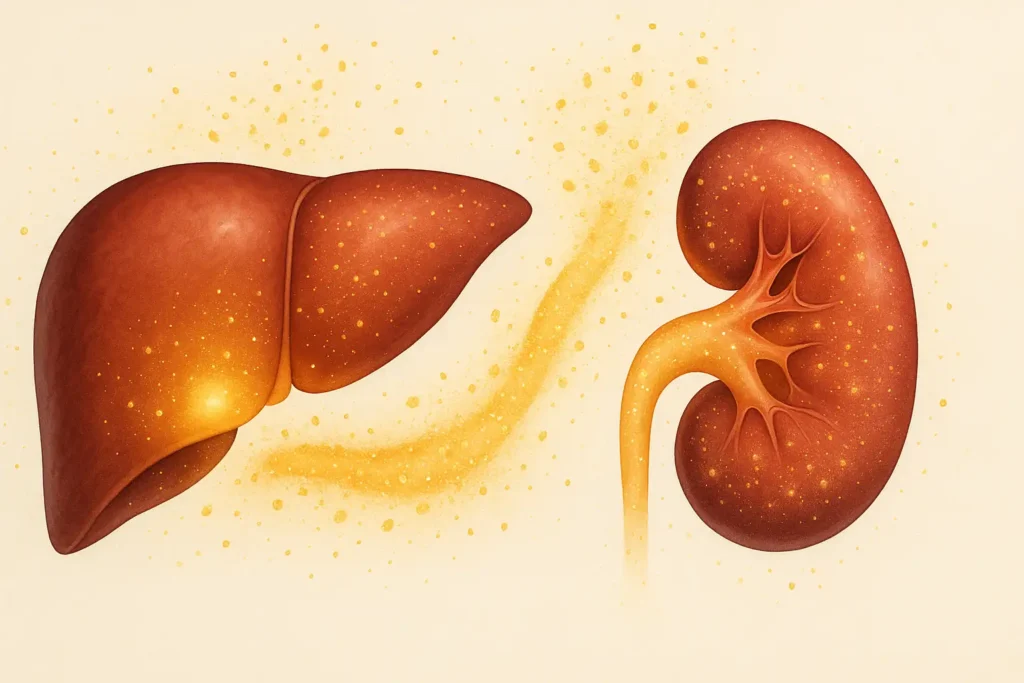In the annals of natural remedies, Arabic Gum holds a place of distinction, weaving a tale of historical significance and cultural richness, while offering a plethora of health benefits.
What is Arabic Gum? Arabic Gum, also known as Gum Arabic, is a unique substance derived from the sap of the Acacia tree, primarily the Acacia senegal and Acacia seyal species. This natural gum is a complex mixture of polysaccharides and glycoproteins. It’s colorless, tasteless, and dissolves easily in water, forming a viscous solution.
Prized for its non-toxic and soluble nature, Arabic Gum has been a staple in food, pharmaceuticals, and cosmetic industries. Its ability to emulsify, stabilize, and provide texture makes it an invaluable ingredient in various products. Beyond its commercial uses, Arabic Gum is also celebrated for its medicinal properties, particularly in gut health, diabetes management, and, notably, in supporting liver and kidney function.
Historical and Cultural Significance The use of Arabic Gum dates back thousands of years, with its roots deeply embedded in African and Middle Eastern cultures. It was a highly valued commodity in ancient trade, often referred to as the “gold of the desert.” The Acacia trees, from which the gum is harvested, are native to the Sahelian region of Africa, extending from Senegal to Somalia.
Historically, Arabic Gum has been used not only as a food additive but also in traditional medicine. It was an essential ingredient in ancient Egyptian embalming practices and was used to treat various ailments in Middle Eastern traditional medicine. Its significance in these cultures is not just medicinal; it also holds a place in social and economic spheres, being a source of livelihood for many communities in the gum-producing regions.
Arabic Gum and Digestive Health
Within the realm of natural health aids, Arabic Gum holds a special place, particularly when it comes to nurturing digestive wellness and promoting a healthy gut environment.

Benefits for Gut Health and Digestion Arabic Gum, known for its gentle yet effective action, is a boon for digestive health. This natural gum, derived from the sap of the Acacia tree, is rich in soluble fiber, a critical element for maintaining healthy digestion. This soluble fiber aids in regularizing bowel movements, thereby reducing the risks of constipation. It also helps in managing diarrhea by absorbing excess water in the intestines and forming a gel-like substance that eases the passage of stools.
But Arabic Gum’s role in digestion goes beyond just regulating bowel movements. Its soluble fiber content is prebiotic, meaning it nourishes the beneficial bacteria in the gut. This action is crucial in maintaining a balanced gut microbiome, essential for efficient digestion and overall gut health.
Role in Promoting Healthy Gut Flora The health of our gut flora, or the community of beneficial bacteria in our digestive system, is instrumental in determining our overall digestive health. Arabic Gum plays a vital role in promoting this gut flora. By providing a food source for these beneficial bacteria, it helps in enhancing their growth and activity. A robust gut microbiome is not just essential for optimal digestion, but it also plays a role in strengthening the immune system and enhancing nutrient absorption.
This nurturing of gut flora by Arabic Gum can be particularly beneficial for individuals with digestive disorders such as irritable bowel syndrome (IBS), as it aids in alleviating symptoms and promoting intestinal health.
Arabic Gum in Managing Fatty Liver Disease
Arabic Gum, a humble yet powerful natural remedy, has emerged as a beacon of hope for individuals battling fatty liver disease, offering a path to improved liver health through nature’s wisdom.
How Arabic Gum Can Benefit Those with Fatty Liver Fatty liver disease, characterized by the accumulation of fat in liver cells, has become increasingly common, largely due to lifestyle factors. Arabic Gum offers a natural therapeutic approach to managing this condition. The key lies in its high content of soluble fiber, which plays a crucial role in metabolizing liver fat.
This soluble fiber aids in reducing the absorption of fat and sugars in the intestine, thereby lowering the liver’s workload and helping to decrease fat accumulation in the liver. Additionally, Arabic Gum’s anti-inflammatory properties are beneficial in reducing the inflammation often associated with fatty liver disease.
The gut-liver axis, a crucial aspect of liver health, is another area where Arabic Gum has a positive impact. By promoting a healthy gut microbiome, Arabic Gum helps improve gut health, which in turn can positively impact liver function and help in managing fatty liver disease.
Studies and Research Findings Recent scientific studies have shed light on the potential of Arabic Gum in managing fatty liver disease. Research indicates that regular consumption of Arabic Gum can significantly reduce markers of liver damage in individuals with fatty liver disease. These studies underscore its potential not only in preventing the progression of fatty liver disease but also in reversing some of its effects.
Clinical trials have also highlighted the role of Arabic Gum in improving liver enzymes and reducing liver inflammation, key factors in managing and treating fatty liver disease. These findings point to Arabic Gum as a promising natural adjunct in liver health management strategies.

The Impact of Arabic Gum on Kidney Health
Arabic Gum, a natural resin with a legacy of healing, plays a significant role in nurturing kidney health, offering a gentle yet effective approach to both managing kidney disease and bolstering preventive care.
Its Role in Kidney Disease Management The management of kidney disease often focuses on reducing the load on the kidneys and preventing further damage. Arabic Gum steps into this realm as a beneficial ally due to its high soluble fiber content. This fiber aids in the regulation of blood sugar and cholesterol levels, both of which are crucial for patients with kidney disease. By helping to maintain these levels within a healthy range, Arabic Gum reduces the strain on the kidneys.
Furthermore, Arabic Gum has been found to have nephroprotective properties. Research indicates that it can help in reducing the progression of chronic kidney disease (CKD) by lowering urea and creatinine levels in the blood, which are key indicators of kidney function. Its antioxidant properties also play a role in protecting the kidneys from further damage caused by oxidative stress.
Preventive Aspects for Kidney Health In terms of prevention, Arabic Gum’s benefits are equally noteworthy. Its ability to assist in blood sugar regulation makes it a valuable dietary addition for those at risk of developing diabetes, a leading cause of kidney disease. Additionally, its role in managing blood pressure is vital, given that hypertension is another major risk factor for kidney disease.
By supporting overall metabolic health, Arabic Gum contributes to maintaining kidney health and preventing the onset of kidney-related issues. Its diuretic properties, promoting the elimination of waste and excess fluid from the body, further underscore its preventive benefits for kidney health.
Nutritional Profile of Arabic Gum
Arabic Gum, a gem in the world of natural supplements, boasts a nutritional profile that is as rich as its history, offering a spectrum of health benefits rooted in its unique composition.
Analysis of Its Vitamins, Minerals, and Fiber Content Arabic Gum is primarily known for its high soluble fiber content. This type of fiber is key in promoting digestive health, as it aids in bowel regularity and acts as a prebiotic, supporting the growth of healthy gut bacteria. The soluble fiber in Arabic Gum also plays a role in cholesterol management, helping to reduce the absorption of cholesterol into the bloodstream.
While not a significant source of vitamins and minerals, the value of Arabic Gum lies in its complex polysaccharides and glycoproteins, which contribute to its health benefits. These compounds are responsible for its efficacy in various health-related areas, from improving kidney function to aiding in diabetes management.
Health Implications of Its Nutritional Makeup The health implications of Arabic Gum’s nutritional makeup are extensive. Its soluble fiber content can help regulate blood sugar levels, making it beneficial for individuals with diabetes. This regulation of blood sugar is also crucial in managing weight and reducing the risk of obesity-related complications.
In terms of heart health, the cholesterol-lowering effect of Arabic Gum’s soluble fiber can contribute to a reduced risk of heart disease. Additionally, its prebiotic nature is instrumental in maintaining a healthy gut microbiome, which is linked to improved digestion, enhanced immune function, and potentially, better mental health.
For individuals with kidney disease, the nephroprotective properties of Arabic Gum can help in managing the condition, while its general health-promoting properties make it a valuable addition to a holistic health regimen.
Arabic Gum as a Natural Remedy for Diabetes
In the quest for natural solutions to manage diabetes, Arabic Gum emerges as a promising ally, offering a gentle yet effective approach to regulating blood sugar levels.
Effectiveness in Blood Sugar Regulation Arabic Gum has gained attention for its potential role in diabetes management, primarily due to its high soluble fiber content. This type of fiber is known to slow down the absorption of sugar in the bloodstream, thereby helping to regulate blood glucose levels. For individuals with diabetes, this can mean more stable blood sugar levels, reduced spikes after meals, and better overall glycemic control.
The mechanism behind this regulation is twofold. First, the soluble fiber in Arabic Gum slows down digestion, leading to a gradual release of glucose. Second, it improves insulin sensitivity, which is crucial for effective blood sugar management. These effects combined can be a significant aid in managing both Type 1 and Type 2 diabetes.
Integrating Arabic Gum into a Diabetic Diet Incorporating Arabic Gum into a diabetic diet can be both simple and beneficial. It can be used as a dietary supplement or added to foods and beverages as a thickening agent. Here are some ways to integrate Arabic Gum into a diabetic-friendly diet:
- As a Supplement: Arabic Gum is available in powder form, which can be mixed into water or smoothies. This can be an easy way to consume it daily.
- In Cooking: Arabic Gum can be used as a stabilizer or thickener in homemade sauces, dressings, or soups, adding both texture and health benefits.
- In Baking: For those who enjoy baking, Arabic Gum can be used in recipes to add fiber without affecting blood sugar levels significantly.
When integrating Arabic Gum into a diabetic diet, it’s important to start with small amounts to monitor its effects on blood sugar levels. Consulting with a healthcare provider or a dietitian can also provide guidance on the appropriate usage and dosage.
The Role of Arabic Gum in Weight Management
In the journey towards achieving a healthy weight, Arabic Gum has emerged as a natural and effective aid, offering a path to weight management that is both gentle and grounded in nature’s wisdom.
How It Aids in Appetite Control and Weight Loss Arabic Gum’s role in weight management is primarily attributed to its high soluble fiber content. This fiber has the remarkable ability to absorb water and form a gel-like substance in the gut, which contributes to a feeling of fullness and satiety. This natural appetite suppressant quality can be particularly beneficial for those looking to control their calorie intake and reduce overeating.
The soluble fiber in Arabic Gum also slows down digestion, which means it can help in prolonging the feeling of fullness after meals. This slower digestion process aids in more gradual sugar absorption, which not only helps in managing blood sugar levels but also prevents the rapid spikes and crashes that can lead to increased hunger and cravings.
Usage in Dietary Supplements Given its benefits in appetite control and weight loss, Arabic Gum is often included as a key ingredient in dietary supplements aimed at weight management. These supplements might come in the form of capsules, powders, or even as an ingredient in meal replacement shakes and bars.
When using Arabic Gum as part of a weight management plan, it’s important to consider the following:
- Dosage: Follow the recommended dosage on supplement labels, and start with a lower dose to assess tolerance.
- Hydration: Due to its high fiber content, it’s crucial to maintain adequate hydration when consuming Arabic Gum.
- Balanced Diet: Arabic Gum should be used as an adjunct to, not a replacement for, a balanced diet and healthy lifestyle.
Arabic Gum for Heart Health
Arabic Gum, a natural treasure from the Acacia tree, extends its healing branches to the realm of heart health, offering a heart-friendly approach backed by scientific evidence.
Benefits for Cholesterol and Heart Health The heart-protective properties of Arabic Gum are primarily attributed to its high soluble fiber content. This type of fiber is known for its ability to bind to cholesterol in the digestive system and help remove it from the body. By lowering the levels of LDL (low-density lipoprotein) cholesterol, often referred to as ‘bad’ cholesterol, Arabic Gum can contribute significantly to cardiovascular health.
Moreover, the reduction in cholesterol levels helps in decreasing the risk of plaque formation in the arteries, a key factor in preventing atherosclerosis – a major contributor to heart disease and strokes. Additionally, the presence of antioxidants in Arabic Gum helps protect the heart and blood vessels from oxidative stress and inflammation, further bolstering heart health.
Scientific Evidence Supporting Its Cardiovascular Effects Numerous studies have highlighted the positive impact of Arabic Gum on heart health. Research has shown that regular consumption of Arabic Gum can lead to a significant reduction in total cholesterol, LDL cholesterol, and triglycerides, all of which are risk factors for heart disease.
Clinical trials also indicate that Arabic Gum can improve the ratio of HDL (high-density lipoprotein) to LDL cholesterol. HDL cholesterol is often termed ‘good’ cholesterol because of its role in removing other forms of cholesterol from the bloodstream. Improving this ratio is considered beneficial for heart health.

Arabic Gum in Traditional Medicine
Arabic Gum, a resin steeped in history, has traversed a remarkable journey from ancient herbal practices to its present stature in modern herbal therapy, continually proving its timeless therapeutic value.
Historical Uses in Herbal Practices The legacy of Arabic Gum in traditional medicine is both rich and diverse, echoing its cultural and historical importance. Harvested from the Acacia trees of the Sahelian region of Africa, it has been a staple in various traditional medicinal systems for centuries.
In ancient Egyptian medicine, Arabic Gum was used for its soothing properties, particularly in treating inflamed skin and soothing mucous membranes. It was also employed in mummification processes, reflecting its preservation qualities. Traditional Arabic medicine utilized this gum extensively for treating a range of ailments, from gastrointestinal issues to respiratory problems.
In African folk medicine, Arabic Gum was a common remedy for wound healing and as a nutritional supplement, particularly in times of scarcity. Its binding and emulsifying properties also made it a valuable ingredient in traditional concoctions and remedies.
Evolution into Modern Herbal Therapy The transition of Arabic Gum into modern herbal therapy is a testament to its enduring medicinal properties. Today, it’s recognized not just for its historical uses but also for its modern applications backed by scientific research. Its role in managing chronic conditions such as diabetes, kidney disease, and digestive disorders aligns with the growing focus on natural and holistic treatments in contemporary healthcare.
Modern herbalists and naturopaths often recommend Arabic Gum for its prebiotic properties, which support gut health, and its gentle effectiveness in managing blood sugar and cholesterol levels, providing a natural approach to health management.
Potential Side Effects and Safety Precautions
While Arabic Gum is lauded for its health benefits, a mindful approach towards its consumption is essential to harness its virtues safely and effectively.
Understanding Possible Side Effects Generally recognized as safe for consumption, Arabic Gum can, however, present some side effects, particularly when consumed in large amounts. The most common of these include:
- Gastrointestinal Issues: Due to its high fiber content, overconsumption of Arabic Gum can lead to gastrointestinal discomfort, including bloating, gas, and in some cases, diarrhea or constipation.
- Allergic Reactions: Rarely, individuals may experience allergic reactions to Arabic Gum, especially if they have sensitivities to Acacia products. Symptoms can range from mild skin rashes to more severe reactions like difficulty breathing or anaphylaxis.
- Interactions with Medications: Arabic Gum may interact with certain medications, such as those for diabetes or high cholesterol, due to its impact on blood sugar and cholesterol levels. It’s important to consult with a healthcare provider if you’re on any medication.
Guidelines for Safe Consumption To safely incorporate Arabic Gum into your health regimen, consider the following guidelines:
- Moderation is Key: Start with small amounts and gradually increase to the recommended dosage to see how your body reacts.
- Stay Hydrated: Increase your water intake when consuming Arabic Gum to aid in fiber absorption and prevent digestive issues.
- Consult Healthcare Providers: Before integrating Arabic Gum into your diet, especially if you have pre-existing health conditions or are taking medication, consult with a healthcare professional.
- Quality Matters: Ensure that you are purchasing high-quality Arabic Gum from reputable sources to avoid contaminants.
- Be Aware of Allergies: If you have a known allergy to Acacia products, it’s best to avoid Arabic Gum or proceed with caution under medical guidance.

Using Arabic Gum in Everyday Diet
Incorporating Arabic Gum into your daily diet can be an enriching experience, blending the art of cooking with the science of nutrition. Here’s how you can make this versatile and healthful ingredient a staple in your kitchen.
Practical Tips and Recipes
- As a Thickener: Arabic Gum can be used as a natural thickener in soups, stews, and sauces. It is particularly useful for gluten-free and low-calorie recipes. Just dissolve a small amount in water and add it to your dish.
- In Baking: For those who enjoy baking, Arabic Gum can be a valuable addition. It helps to bind ingredients together, making it ideal for gluten-free recipes. Use it in bread, cookies, or cakes to improve texture and moisture retention.
- Smoothies and Beverages: Add Arabic Gum to your smoothies for an extra fiber boost. It’s also great in homemade nut milks or yogurt drinks, adding creaminess without affecting the flavor.
- Salad Dressings: Use Arabic Gum as an emulsifier in homemade salad dressings. It helps to blend oil and vinegar seamlessly, creating a more consistent dressing.
Recipes Using Arabic Gum
- Arabic Gum Smoothie: Blend a handful of your favorite fruits, a cup of almond milk, a tablespoon of Arabic Gum, and a touch of honey for a nutritious and filling smoothie.
- Gluten-Free Arabic Gum Bread: Mix Arabic Gum with gluten-free flour, yeast, and your preferred sweetener to bake a loaf of gluten-free bread that’s both tasty and satisfying.
- Homemade Vegan Cheese: Arabic Gum can be used to make vegan cheese. Blend soaked cashews, nutritional yeast, Arabic Gum, and seasonings for a dairy-free cheese alternative.
Incorporating Arabic Gum in Daily Meals Adding Arabic Gum to your daily meals can be as simple as sprinkling it onto your cereal or oatmeal or mixing it into your tea or coffee. The key is to start with small quantities and gradually increase to suit your taste and dietary needs.
Emerging Research and Future Prospects
Arabic Gum, a substance steeped in ancient tradition, is blossoming anew under the scrutiny of modern science, revealing exciting possibilities and future applications in the realm of health and wellness.
Recent Studies and Potential Future Applications The landscape of research around Arabic Gum is expanding, with recent studies uncovering a range of potential health benefits and novel uses. Key areas of focus include its impact on chronic diseases, such as diabetes and heart disease, as well as its role in improving gut health and weight management.
- Diabetes Management: Recent studies have explored Arabic Gum’s role in regulating blood sugar levels. The research suggests that its high fiber content can help in slowing glucose absorption, making it a valuable dietary addition for people with diabetes.
- Heart Health: Investigations into Arabic Gum’s impact on cholesterol levels have shown promising results. Its ability to lower bad cholesterol (LDL) and maintain good cholesterol (HDL) levels points to its potential in preventing heart disease.
- Gut Health and Microbiome: Emerging research is focusing on Arabic Gum’s prebiotic properties and its role in promoting a healthy gut microbiome. This has significant implications for digestive health and possibly for mental well-being, given the gut-brain axis.
- Weight Management: Studies are also examining how Arabic Gum can aid in weight loss and obesity management, thanks to its ability to promote feelings of fullness and reduce appetite.
Future Prospects Looking ahead, the potential applications of Arabic Gum are vast and varied. Researchers are delving into its use as a natural food preservative, its potential in skincare and cosmetic products, and its role in sustainable food production. The environmental benefits of Arabic Gum, particularly in terms of sustainable harvesting and its role in supporting local communities, are also areas ripe for exploration.
Conclusion
As we reach the culmination of our exploration into the world of Arabic Gum, it’s clear that this age-old natural resin is not just a mere dietary supplement, but a beacon of holistic wellness, especially for those grappling with fatty liver and kidney disease.
Arabic Gum, with its rich soluble fiber content and a host of beneficial properties, stands out as a natural ally in supporting overall health. Its role in managing fatty liver disease is particularly noteworthy. By aiding in the reduction of fat accumulation in the liver and improving liver function markers, Arabic Gum offers a glimmer of hope to those facing this increasingly common health challenge.
In the realm of kidney health, Arabic Gum’s protective properties shine through. Its ability to aid in regulating blood sugar and cholesterol levels, coupled with its antioxidant and anti-inflammatory effects, makes it a valuable addition to kidney disease management strategies.
But the benefits of Arabic Gum extend beyond these areas. Its impact on digestive health, weight management, heart health, and blood sugar regulation speaks to its multifaceted role in promoting wellness. The emerging research on its potential applications in various health conditions and industries only adds to its intrigue and promise.
As we advocate for a holistic approach to health, integrating Arabic Gum into our diet is a step towards embracing natural, sustainable, and effective health solutions. Whether used in traditional medicine or as part of modern dietary practices, Arabic Gum represents a convergence of history, culture, and modern science, all working together to enhance our well-being.
Resources
- National Center for Biotechnology Information (NCBI): An invaluable resource for accessing scientific studies and research papers on the health benefits and therapeutic uses of Arabic Gum. Explore NCBI Studies on Arabic Gum
- World Health Organization (WHO) Monographs on Selected Medicinal Plants: These monographs provide detailed information on the medicinal uses of various plants, including Arabic Gum, backed by scientific and clinical research. Visit WHO Monographs
- WebMD – Arabic Gum Overview: Offers comprehensive insights into Arabic Gum, including its uses, benefits, side effects, and interactions, helping readers make informed health decisions. Check Out WebMD’s Arabic Gum Section
- Healthline – Arabic Gum Guide: A user-friendly guide that covers various aspects of Arabic Gum, from health benefits to usage tips. Visit Healthline for Arabic Gum Information
- The Herbal Resource: Provides information on the traditional and modern uses of Arabic Gum, its health benefits, and how to use it effectively. Learn More from The Herbal Resource


10 thoughts on “Arabic Gum: Transform Your Health Journey with Its Remarkable Impact on Liver and Kidney”